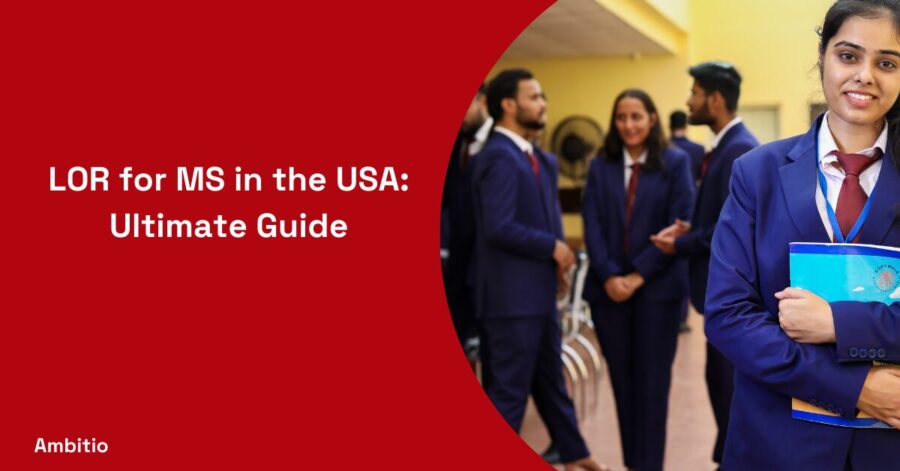17 December 2024
8 minutes read
LOR for MS in the USA: Ultimate Guide

KEY TAKEAWAYS
- Impact of LOR: A well-crafted LOR provides a nuanced view of your academic and professional capabilities, offering insights that grades and test scores cannot.
- Authenticity Matters: Genuine, detailed anecdotes in a LOR resonate more with admissions committees than generic praise.
- Professionalism: LORs should be on official letterhead, well-structured, and succinct, reflecting both the applicant’s and the recommender’s professionalism.
- Balanced Content: Effective LORs balance academic achievements with personal qualities, showing a well-rounded candidate.
- Follow-Up: Ensure your LORs are submitted on time; follow up with recommenders and universities if necessary.
The Letter of Recommendation (LOR) is a critical component of your application for a master’s program in a US university. Serving as a testament to your academic and professional achievements, a well-crafted LOR can significantly elevate your candidacy.
It provides an external perspective on your capabilities, ethics, and achievements, offering a comprehensive insight into your potential as a student and future professional.
The Role and Impact of a Well-Drafted LOR in Your MS Application
A compelling LOR does more than list your accomplishments; it narrates your journey, emphasizing key moments where you demonstrated excellence, leadership, and innovation. It’s not just about what you’ve done, but how you’ve done it, and who’s witnessed your growth along the way.
Importance & Useful Information on LOR for MS in the USA

The Role of LOR in Securing Admission to Top US Universities
| Aspect | Description |
|---|---|
| Academic Excellence | While grades and test scores are critical, they don’t provide a complete picture. LORs offer insights into the applicant’s intellectual curiosity and dedication to their field. |
| Well-Roundedness | Admissions committees seek candidates who contribute to a dynamic and diverse student body. LORs highlight your extracurricular activities, leadership roles, and personal initiatives. |
| Personal Endorsement | A recommender vouches for your potential, sharing personal anecdotes and observations that reflect your character and capabilities. |
| Professional Validation | For applicants with work experience, a professional LOR confirms practical skills and the ability to apply academic knowledge in real-world settings. |
| Research Potential | Especially for research-oriented programs, LORs from past research mentors can showcase your ability to conduct and contribute to scholarly work. |
| Unique Perspective | Each LOR provides a different viewpoint, collectively presenting a holistic view of the applicant’s abilities, personality, and potential. |
QUICK TIP
Choose the Right Recommender: Select someone who knows you well, can provide detailed examples of your accomplishments, and can speak to your character and potential.
Why Your LOR Can Make or Break Your Admission Chances
- Personalized Endorsement: A detailed LOR from someone who knows you well is more than a recommendation; it’s a personal vote of confidence in your future success.
- Differentiation Factor: In a pool of candidates with similar academic achievements, a compelling LOR can be the tipping point, highlighting your unique strengths and experiences.
- Reputation at Stake: Recommenders put their reputation on the line when they vouch for you, adding weight to their words and ensuring they truly believe in your potential.
- Detailed Insights: LORs provide specific examples and stories that illustrate your skills and character, giving depth to your application that grades and scores cannot.
Insights from Admissions Committees
| Element | Description |
|---|---|
| Authenticity | Committees can discern genuine praise from generic flattery. Authentic LORs resonate more and add credibility to your application. |
| Detail-Oriented | Specific anecdotes and examples provide a vivid picture of the applicant’s abilities and achievements, making the LOR more impactful. |
| Character Insights | Beyond academics, LORs shed light on the applicant’s personal qualities like resilience, leadership, empathy, and teamwork. |
| Comparative Context | How you stand in comparison to peers or previous students the recommender has known can significantly influence the committee’s perception. |
| Future Potential | Recommenders often predict the applicant’s ability to succeed in the program and their field, which is a critical consideration for admissions officers. |
| Consistency | Committees look for consistency between the LOR and the rest of the application, ensuring the portrayal is accurate and comprehensive. |
Whom to Approach for a LOR?
- Selecting the Right Recommender: Choose someone who knows you well and can provide specific examples and a detailed assessment of your skills and accomplishments.
- Professor vs Employer:
- Academic LOR: Suitable for highlighting intellectual curiosity and academic skills. Best from a professor familiar with your academic work and research.
- Professional LOR: Ideal for showcasing practical skills and work ethic. Opt for an employer, supervisor, or team leader who has closely observed your professional contributions.
- Tips for Candidates:
- Without Work Experience: Prioritize professors who have overseen your academic projects or research, as they can best attest to your capabilities and potential.
- With Work Experience: Seek a LOR from a direct supervisor or team leader who can vouch for your professional skills, contributions, and work ethic.
- Comprehensive Guidelines for a Strong LOR for MS in the USA:
- Emphasize the importance of a letter that is not only detailed and personalized but also well-structured to facilitate easy reading and understanding.
- Highlight that the letter should go beyond surface-level praise to reflect a deep, genuine, and informed endorsement of the candidate, showcasing a thorough understanding of their strengths and potential.
- Emphasize the importance of a letter that is not only detailed and personalized but also well-structured to facilitate easy reading and understanding.
- Detailed Steps for Writing a Persuasive LOR:
- Introduction:
- Identify the recommender, their professional title or relationship to the applicant, and the duration and capacity of their acquaintance.
- Mention the purpose of the letter and the recommender’s intention to endorse the applicant for a Master’s program in the USA.
- Body:
- Elaborate on the applicant’s specific skills, citing examples of academic projects, research, or professional tasks where these skills were demonstrated.
- Discuss the applicant’s achievements, awards, or recognitions received in academic or professional settings, providing context and impact.
- Reflect on the applicant’s personal growth over time, detailing instances where they overcame challenges, exhibited leadership, or showed significant improvement.
- Introduction:
Content Dos and Don’ts – Expanded:
- Include:
- Specific anecdotes provide a vivid picture of the applicant’s capabilities, such as how they approached a complex project or contributed to a team.
- Examples that show the applicant’s character, work ethic, intellectual curiosity, and other personal attributes relevant to a graduate study environment.
- Avoid:
- Vague statements that could apply to any applicant, such as “hard-working” or “intelligent,” without providing supporting details or examples.
- Overused clichés and generic phrases that don’t add value to the applicant’s profile.
- Any form of exaggeration or misrepresentation of the applicant’s abilities or experiences, as credibility is crucial for a persuasive LOR.
QUICK TIP
Personalize Your LOR: Tailor each LOR to the specific program and university, highlighting how your experiences align with the program’s goals.
LOR Format for MS in the USA

A well-organized Letter of Recommendation (LOR) is essential for making a positive impression on admissions committees at U.S. universities. It reflects not just the applicant’s qualifications but also the professionalism and credibility of the recommender. Here’s an in-depth look at the format and structure.
Understanding the Structure and Format Details
- Official Letterhead: The LOR should be printed on the official letterhead of the recommender’s organization or institution. This provides authenticity and indicates the professional capacity in which they know the applicant.
- Word Count: Typically, a good LOR is concise and impactful, ideally within the range of 400-500 words.
- Font and Spacing: Use a standard, professional font (like Times New Roman or Arial) and maintain clear spacing (1.15 to 1.5) for readability.
- Sections: A standard LOR includes an introduction, body paragraphs detailing the applicant’s qualifications and character, and a strong concluding statement.
- Signature: A handwritten signature adds a personal touch and is often required to verify the authenticity of the letter.
Detailed Breakdown of LOR Structure
| Section | Description |
|---|---|
| Introduction | Briefly introduce the recommender, their relationship to the applicant, and the length of time they’ve known each other. |
| Body Paragraphs | Discuss the applicant’s skills, achievements, and character. Use specific examples and anecdotes to illustrate points. Ideally, include 2-3 paragraphs, each focusing on different aspects of the applicant’s profile. |
| Conclusion | End with a strong, affirmative statement recommending the applicant for the MS program. Mention the applicant’s potential for success in both the program and future career. |
| Closing | Include a formal sign-off, the recommender’s full name, position, contact information, and signature. |
Is a Letterhead Necessary for Your LOR?
- Authenticity: A letterhead verifies the origin of the letter and the recommender’s position and affiliation.
- Professionalism: It reflects the seriousness and formal nature of the recommendation.
- Requirement: Many universities explicitly require LORs to be on official letterhead to consider them valid.
LOR Samples for MS in the USA
Sample Introductory Sentence:
“I am writing to wholeheartedly recommend [Applicant’s Name] for your Master’s program in [Subject/Area of Study]. As [Your Position] at [Institution or Company], I have had the pleasure of knowing and working with [Applicant’s Name] for [Duration].”
Sample Body Paragraph Sentence:
“In my [X years] of teaching, few students have stood out as impressively as [Applicant’s Name]. In our [Course/Project], they demonstrated [specific skill or attribute], notably when they [describe a specific achievement or incident].”
Sample Conclusive Sentence:
“I am confident that [Applicant’s Name] will bring the same level of dedication, innovation, and brilliance to your program that they have consistently demonstrated here. They have my highest recommendation.”
Difference Between LOR and Reference Letter
| Aspect | Letter of Recommendation (LOR) | Reference Letter |
|---|---|---|
| Definition | A detailed narrative written by a recommender who knows the candidate well. | A brief endorsement, often in a standard format, from a referee. |
| Purpose | To provide an in-depth evaluation of the candidate’s skills, accomplishments, and potential. | To confirm the candidate’s qualifications and endorse them briefly. |
| Length | Typically longer, providing a comprehensive insight into the candidate’s abilities. | Usually shorter, offering a concise endorsement. |
| Detail Level | High; includes specific anecdotes and examples. | Lower; more likely to include general statements. |
| Personalization | Highly personalized, reflecting a deep understanding of the candidate. | Less personalized, often following a standard format. |
| Common Use | Often required for academic admissions, scholarships, and sometimes job applications. | Commonly used for job applications and sometimes for academic purposes. |
For an insightful difference between a Letter of Recommendation and a Reference Letter, read more
How to Distinguish and Leverage Each in Your Application
| Factor | Letter of Recommendation (LOR) | Reference Letter |
|---|---|---|
| When to Use | Use when an in-depth review of your capabilities and character is needed. | Use when a brief, formal endorsement is sufficient. |
| Best for | Academic admissions, scholarships, and competitive job roles. | Job applications, especially when the employer requests it. |
| Selection of Recommender/Referee | Choose someone who knows you well and can provide detailed insights (professors, managers). | Choose someone who can vouch for your qualifications (colleagues, previous employers). |
| Content Focus | Focus on detailed stories and specific examples of skills, achievements, and growth. | Focus on confirming your qualifications and providing a positive endorsement. |
| Impact | Can significantly influence the decision due to its depth and personal insights. | Supports your application by adding credibility but usually has less weight than a LOR. |
| Preparation Time | Longer, as it requires the recommender to compose a detailed and thoughtful narrative. | Shorter, as it often follows a more straightforward and brief format. |
QUICK TIP
Request Early: Ask for your LOR well in advance, giving your recommender ample time to write a thoughtful and comprehensive letter.
Conclusion
Crafting a standout LOR for your MS application in the USA is an essential step in showcasing your full potential to admissions committees.
A well-structured, personalized, and detailed LOR not only highlights your academic and professional achievements but also offers a glimpse into your character and suitability for the program. Remember, a strong LOR can significantly boost your application, setting you apart from the competition.
Discover where your ambitions align with available scholarships through Ambitio’s Scholarship Finder. This platform is your gateway to financial resources that support your dedication to academic achievement and personal growth.
FAQs
How many LORs are generally required for MS applications in the USA?
Most universities in the USA require two to three LORs for MS applications. However, it’s crucial to check the specific requirements of each university and program.
Can I use the same LOR for multiple applications?
While you can use the same recommender, it’s advisable to tailor each LOR to the specific program and university to which you’re applying. This personalization can significantly impact the effectiveness of the LOR.
How long before the application deadline should I ask for an LOR?
Ideally, request a LOR at least one to two months before your application deadline. This gives your recommender ample time to craft a thoughtful and detailed letter.
Should the LOR focus more on academic achievements or personal qualities?
A balanced LOR that showcases both your academic excellence and personal qualities, like leadership and teamwork, is typically the most effective.
Can a family member write a LOR for me?
LORs should be written by individuals who have supervised you in an academic or professional setting. Family members are generally not considered appropriate recommenders unless they have directly overseen your work in a professional capacity.
What should I do if my LOR is late or missing?
Contact your recommender to remind them of the deadline. If it’s very close to the deadline or passed, you might need to seek an alternative quickly or contact the university’s admissions office to explain the situation and ask for guidance.
Is it necessary for the recommender to mention the duration of their association with the applicant?
Yes, mentioning the duration helps establish the context and depth of their understanding of the applicant’s abilities and character.

You can study at top universities worldwide!
Get expert tips and tricks to get into top universities with a free expert session.
Book Your Free 30-Minute Session Now! Book a call now




























